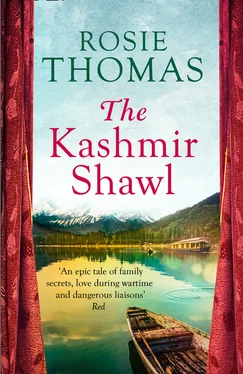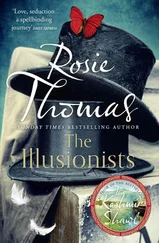1 ...6 7 8 10 11 12 ...22 ‘Even though I was turning somersaults?’
‘Because of that, as much as anything else. Why suppress what you wanted to emote? You are the complete you. I endorse that.’
Bruno wasn’t spiritual in the same sense that she was, Karen continued, but he understood where she was coming from because he related to the mountains. They were his temples, and he made his own pilgrimages among them. ‘Take Lotus, for example. I believe in letting her experience the whole world as essentially benign. I want her to grow up as far as possible without fear, without unnecessary restrictions, without petty rules, so she can become her intended self within the stream.’
Mair wondered if Lotus – quite understandably – dealt with excess benignity by having a tantrum or two.
They had finished their coffee and cake. Karen dotted up the last of the crumbs with a fingertip and licked it. She said, ‘I must go. What are your plans? We’ll be out of town for four or five days.’
‘I’ve got some stuff to look into here. I don’t know how long that’ll take.’
Karen studied her, her finger still resting against her lips. Mair noticed how the two or three other tourists in the bakery couldn’t help gazing at her companion.
‘You’re very mysterious, you know,’ Karen said.
‘No, I’m not,’ Mair protested.
‘But you’ve never let on why you’re in Ladakh. You’re not just here for a sightseeing holiday, I can tell that much.’
Mair wasn’t going to try to describe the shawl to Karen, or the lock of hair, or the blanks in the family history that had colonised her imagination with such force. Awkwardly, she said, ‘My father died recently.’
At once, Karen’s face flooded with sympathy. ‘I’m sorry,’ she said warmly. ‘That’s sad for you. You were drawn to a Buddhist country for a reason. Have you heard of punabbhava? It means “becoming again”. That’s the belief we have in rebirth. It doesn’t annihilate grief or loss, and it isn’t meant to, but contemplation of it provides comfort. Sometimes it does, at least.’
Her new friend meant well, Mair realised, and the way she talked might sound alien but it was certainly sincere. ‘Thank you.’ She smiled.
Karen squeezed her hands and stood up. She paid for their tea, waving away Mair’s proffered money. ‘Where are you staying?’
Mair told her.
‘So we’ll see you when we get back.’
The next day Mair went to visit the Leh Pashmina Processing Plant. The weather was changing, as if to underline the Beckers’ absence. The gilded autumn sunshine Mair had begun to take for granted was filtered out today by low, thin grey clouds as the last leaves were chased down from the poplar trees by an insistent wind.
A small man in a baseball cap emerged from one of the plant’s grimy buildings to meet her. ‘My name is Tinley. I am assistant manager of production. This way to see the magic, ma’am,’ he joked, as he led her across the yard to a concrete shed. Mair followed, not sure what he meant.
Inside, four women squatted in a circle. They had shawls drawn over their heads and across the lower half of their faces. Between them towered a heap of fleece, thick curled clods of raw goat’s hair matted with dung, grease and twigs, looking exactly as Mair had seen it when it was stuffed into bags up on the plateau. There was no doubt that this was the untreated pashm fibre as it arrived by truck from distant Changthang. The women were teasing out the clumps by hand, removing the worst of the filth and sorting the hair into smaller heaps according to colour, from palest grey-white to dark brown. The air in the bare room seemed almost solid with the rancid odour of goat.
Tinley made a small gesture of regret. ‘This is a colour-separating process. It can only be done by the human eyes.’ Then he brightened. ‘But, as you will see, the rest of our process is modern. Highly mechanised. Come this way, please.’
A metal door slid open on runners and Mair stepped into the next section of the plant. She had been aware of the hum of machinery, but she blinked at the sheer size of what lay beyond the door. The machine must have been fifty yards long, a leviathan of rotating belts and spinning flywheels, vast rubber rollers and steaming tanks. At the end of the line was a drying chamber from which the wool emerged cleaner and softer, but still with thick coarse hairs and fragments of dirt trapped in it.
‘What now?’ she asked, as she twisted a hank between her fingers.
A second metal door opened ahead. A wave of humid air, heavy with the smell of wet wool, rolled over her.
‘Why is it so hot? And so damp?’ she choked out.
‘It is a humidified chamber,’ Tinley said proudly. ‘It makes the wool easier to work. This is the dehairing section, see?’
They peered into the machinery. At each stage the remaining wool emerged whiter and softer, as the pure fleece – the goat’s innermost insulation against the Himalayan cold – was separated out.
At the end of the line, after another drying chamber, the belt turned back on itself. One man sat in reverent attendance as the cleansed and blow-dried end product billowed from the jaws of the machinery.
Mair couldn’t help herself. She stepped forward and plunged her arms up to the elbows into pure pashm. It was like handling a cloud, weightless and pure, and exactly the same colour. She remembered that one kilo of the greasy, reeking wool she had seen at the beginning of the line produced a mere three hundred grams of this airy fleece. ‘It is a kind of magic,’ she agreed.
Tinley’s eyes glinted. ‘Come with me.’ He settled his baseball cap squarely on his head and led the way out of the processing plant.
The back lanes were too narrow for two to walk abreast, and were overhung with washing lines, the branches of knotty old trees and the projecting balconies of houses. Tinley walked so fast that Mair had to concentrate on keeping up. At a collapsing set of gates in a whitewashed wall he suddenly stopped and nodded her through. Hens scratched in refuse and the call of the muezzin rose over the housetops.
‘Julley,’ Tinley called, to a man leaning on a broom.
Up four stone steps and through a narrow door, they came into a roomful of women seated at wooden looms. There was a steady creak of floor treadles and the flash of shuttles as they worked. They were weaving plain pashmina lengths, in soft shades of grey and brown. These workers, Tinley told her, were producing shawls for sale through the state-sponsored craft-industry outlets in Leh. ‘Very traditional methods preserved, nice work for women here. They can work what hours they can, make some money, and also take care of families.’
‘That’s good,’ Mair acknowledged. But she was puzzled by how different these pieces were from her own.
They passed through the weavers’ studio and the women looked up at her and smiled as she passed. The front of the building, to Mair’s surprise, opened out on to a view she recognised – the main street, with the minarets of the central mosque rising against the hill crowned with the old palace. Via the backstreet labyrinth they had come into a shawl showroom, lined with the now-familiar shelves. A salesman grinned a flash of gold incisor at her as he began to slide his wares out of their plastic bags.
Leh could sometimes seem like one large wool-based retail opportunity.
There was no question of withholding her custom, though, after Tinley had patiently taken her through the manufacturing processes. Mair obediently picked out three shawls: a pearl-grey one for Eirlys, a toffee-brown one for herself, and a cream one for Hattie, which would suit her friend’s dark colouring. She paid twelve thousand rupees in all, and reminded herself that it was not such a great deal of money for all the work that had gone into producing the pashmina fibre.
Читать дальше












